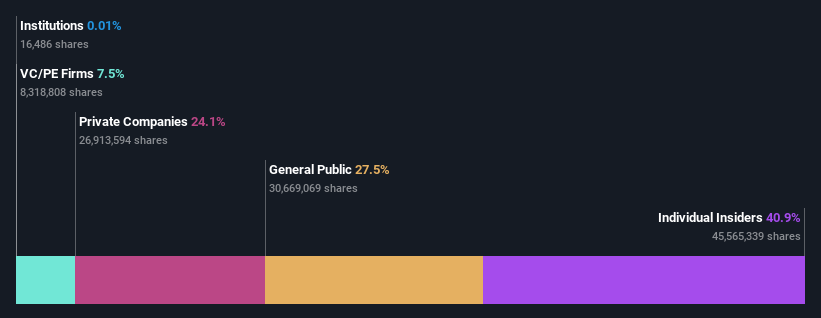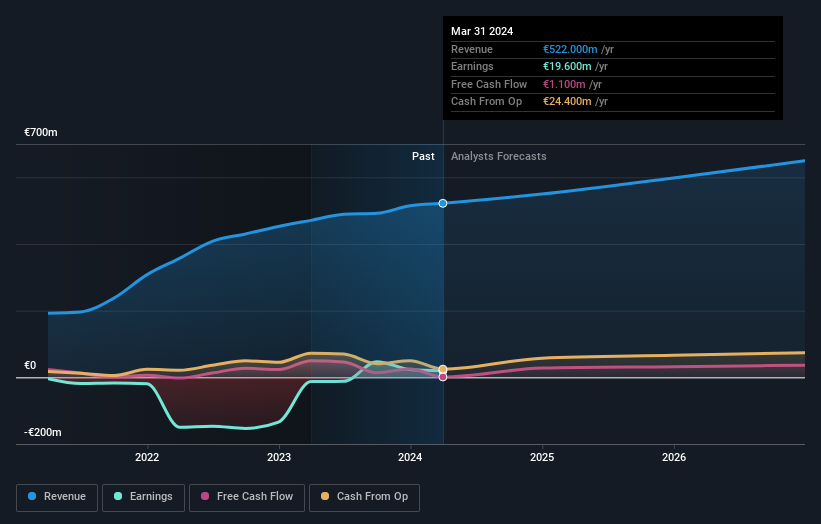- Netherlands
- /
- Interactive Media and Services
- /
- ENXTAM:AZRN
Azerion Group N.V. (AMS:AZRN) adds €21m in market cap and insiders have a 41% stake in that gain

Key Insights
- Azerion Group's significant insider ownership suggests inherent interests in company's expansion
- The top 3 shareholders own 57% of the company
- Using data from company's past performance alongside ownership research, one can better assess the future performance of a company
To get a sense of who is truly in control of Azerion Group N.V. (AMS:AZRN), it is important to understand the ownership structure of the business. With 41% stake, individual insiders possess the maximum shares in the company. That is, the group stands to benefit the most if the stock rises (or lose the most if there is a downturn).
As a result, insiders scored the highest last week as the company hit €186m market cap following a 13% gain in the stock.
Let's take a closer look to see what the different types of shareholders can tell us about Azerion Group.
View our latest analysis for Azerion Group

What Does The Lack Of Institutional Ownership Tell Us About Azerion Group?
Institutional investors often avoid companies that are too small, too illiquid or too risky for their tastes. But it's unusual to see larger companies without any institutional investors.
There are many reasons why a company might not have any institutions on the share registry. It may be hard for institutions to buy large amounts of shares, if liquidity (the amount of shares traded each day) is low. If the company has not needed to raise capital, institutions might lack the opportunity to build a position. Alternatively, there might be something about the company that has kept institutional investors away. Institutional investors may not find the historic growth of the business impressive, or there might be other factors at play. You can see the past revenue performance of Azerion Group, for yourself, below.

Hedge funds don't have many shares in Azerion Group. The company's largest shareholder is Principion Holding B.V., with ownership of 24%. The second and third largest shareholders are Umut Akpinar and Atilla Aytekin, with an equal amount of shares to their name at 17%. Umut Akpinar, who is the second-largest shareholder, also happens to hold the title of Chief Executive Officer.
A more detailed study of the shareholder registry showed us that 3 of the top shareholders have a considerable amount of ownership in the company, via their 57% stake.
While studying institutional ownership for a company can add value to your research, it is also a good practice to research analyst recommendations to get a deeper understand of a stock's expected performance. There is some analyst coverage of the stock, but it could still become more well known, with time.
Insider Ownership Of Azerion Group
The definition of company insiders can be subjective and does vary between jurisdictions. Our data reflects individual insiders, capturing board members at the very least. Company management run the business, but the CEO will answer to the board, even if he or she is a member of it.
Insider ownership is positive when it signals leadership are thinking like the true owners of the company. However, high insider ownership can also give immense power to a small group within the company. This can be negative in some circumstances.
It seems insiders own a significant proportion of Azerion Group N.V.. It has a market capitalization of just €186m, and insiders have €76m worth of shares in their own names. It is great to see insiders so invested in the business. It might be worth checking if those insiders have been buying recently.
General Public Ownership
The general public-- including retail investors -- own 28% stake in the company, and hence can't easily be ignored. This size of ownership, while considerable, may not be enough to change company policy if the decision is not in sync with other large shareholders.
Private Equity Ownership
Private equity firms hold a 7.5% stake in Azerion Group. This suggests they can be influential in key policy decisions. Sometimes we see private equity stick around for the long term, but generally speaking they have a shorter investment horizon and -- as the name suggests -- don't invest in public companies much. After some time they may look to sell and redeploy capital elsewhere.
Private Company Ownership
Our data indicates that Private Companies hold 24%, of the company's shares. It might be worth looking deeper into this. If related parties, such as insiders, have an interest in one of these private companies, that should be disclosed in the annual report. Private companies may also have a strategic interest in the company.
Next Steps:
It's always worth thinking about the different groups who own shares in a company. But to understand Azerion Group better, we need to consider many other factors. For instance, we've identified 3 warning signs for Azerion Group (1 is a bit concerning) that you should be aware of.
If you are like me, you may want to think about whether this company will grow or shrink. Luckily, you can check this free report showing analyst forecasts for its future.
NB: Figures in this article are calculated using data from the last twelve months, which refer to the 12-month period ending on the last date of the month the financial statement is dated. This may not be consistent with full year annual report figures.
New: Manage All Your Stock Portfolios in One Place
We've created the ultimate portfolio companion for stock investors, and it's free.
• Connect an unlimited number of Portfolios and see your total in one currency
• Be alerted to new Warning Signs or Risks via email or mobile
• Track the Fair Value of your stocks
Have feedback on this article? Concerned about the content? Get in touch with us directly. Alternatively, email editorial-team (at) simplywallst.com.
This article by Simply Wall St is general in nature. We provide commentary based on historical data and analyst forecasts only using an unbiased methodology and our articles are not intended to be financial advice. It does not constitute a recommendation to buy or sell any stock, and does not take account of your objectives, or your financial situation. We aim to bring you long-term focused analysis driven by fundamental data. Note that our analysis may not factor in the latest price-sensitive company announcements or qualitative material. Simply Wall St has no position in any stocks mentioned.
About ENXTAM:AZRN
Azerion Group
Operates a digital entertainment and media platform in the Netherlands, Germany, France, Great Britain, Ireland, Italy, other Nordic and European countries, the United States, the United Arab Emirates, and internationally.
Undervalued with reasonable growth potential.
Market Insights
Community Narratives



